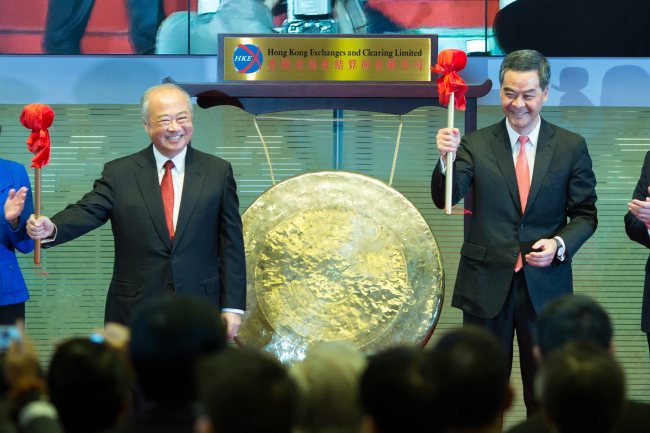HONG KONG (AFP) ― A landmark trading link that is expected to see billions of dollars in cross-border transactions between Hong Kong and Shanghai’s stock exchanges officially launched Monday, but figures show mainlanders are holding back from piling into Hong Kong.
The Shanghai-Hong Kong Stock Connect is expected to allow the equivalent of $3.8 billion a day in cross-border transactions and open up the mainland’s closeted equities markets to the world.
At the opening ceremony Charles Li, chief executive of Hong Kong’s stock exchange, declared the tie-up a “historic” moment and hailed a “new era” of trade, while chairman Chow Chung Kong said it was a “breakthrough in the opening up of China’s financial market.”
The link enables international investors to trade selected stocks on Shanghai’s tightly restricted exchange and let mainland investors buy shares in Hong Kong.
 |
Hong Kong Exchanges and Clearing Limited chairman Chow Chung-kong (left) and Hong Kong’s Chief Executive Leung Chun-ying (right) react as they attend the Stock Connect launch ceremony at the Hong Kong Stock Exchange in Hong Kong, China, Monday. (EPA-Yonhap) |
Hong Kong investors had exhausted their daily allowance of Shanghai shares by 2 p.m. Monday, but mainlanders were less keen ― using up less than 20 percent of their quota by the close of trade.
Jackson Wong, associate director at Simsen International Financial Group, told AFP: “Northbound (trading) is many times higher than south bound. That means Chinese investors are not blindly buying H.K. stocks. It’s not a bad sign.”
Hong Kong stocks closed Monday down 1.21 percent, or 290.30 points at 23,797.08. In Shanghai, the benchmark composite index also lost morning’s gains and closed 0.19 percent lower at 2,474.01.
Wong added: “Investors had a lot of hype on this program. It’s a typical situation where investors are taking profits from the huge run up. They are taking a breather to see how this will go.”
At the opening ceremony in Shanghai, Xiao Gang, head of the China Securities Regulatory Commission, said the new platform was “conducive to the internationalization of the renminbi.”
He added: “Shanghai-Hong Kong Stock Connect is a major initiative to promote mutual opening up of the capital markets in the two cities. It’s a major institutional innovation of the capital markets.
“China’s capital markets now face historic opportunities.”
The creation of the trading platform is seen as a key step towards greater liberalization in the world’s second largest economy.
But it is subject to strict limits in order to preserve capital controls in China, where Communist authorities keep a tight grip on the yuan currency.
If an investor buys stocks in the other market, when they sell the money can only go back to their home market account, a so-called “closed path” to prevent “hot money” leaking out.
Beijing has granted an initial cumulative quota of 250 billion yuan ($41 billion) for trading of Hong Kong stocks, while 300 billion yuan is allowed for Shanghai equities, with daily allowances of 10.5 and 13 billion yuan respectively.
The Hong Kong Monetary Authority, the city’s de facto central bank, last week lifted a daily cap for converting the local dollar to yuan to facilitate the trading link.
Analysts say that will bring easier access to renminbi for local residents and encourage the use of the currency.
But while the link gives Hong Kong a route into the world’s second biggest economy, figures suggest the interest is currently only one-way.
At a retail brokerage outlet of Guotai Junan Securities in a Shanghai suburb, a terminal dedicated to the Connect sat unused alongside other computers for trading domestic A shares.
Retail investors, mainly retired people, said they did not meet the $82,000 minimum capital requirement to trade Hong Kong stocks.
“I don’t have enough money to invest,” said one woman in her 60s.
And Wang Chenyu, a Shenzhen-based investor who already trades Hong Kong stocks, said: “Shanghai-Hong Kong Stock Connect offers a limited scope of shares for trading and it has investment quotas, so I did not pay special attention to it. It does not have any special advantages.”





![[Exclusive] Hyundai Mobis eyes closer ties with BYD](http://res.heraldm.com/phpwas/restmb_idxmake.php?idx=644&simg=/content/image/2024/11/25/20241125050044_0.jpg)
![[Herald Review] 'Gangnam B-Side' combines social realism with masterful suspense, performance](http://res.heraldm.com/phpwas/restmb_idxmake.php?idx=644&simg=/content/image/2024/11/25/20241125050072_0.jpg)

